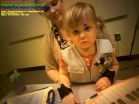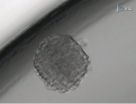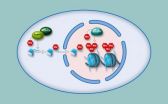(Press-News.org) Although they're a common nuisance in the home, fruit flies have made great contributions to research in genetics and developmental biology. Now a Tel Aviv University researcher is again turning to this everyday pest to answer crucial questions about how neurons function at a cellular level — which may uncover the secrets of neurological disorders such as Alzheimer's disease.
Approximately 75 percent of the genes that are related to diseases in humans are also to be found in the fly, says Ya'ara Saad, a PhD candidate in the lab of Prof. Amir Ayali at TAU's Department of Zoology and the Sagol School of Neurosciences. There are many similarities in the functioning of the nervous system in both organisms, and by observing how neuronal networks taken from the fly grow and function outside of the body, there are many clues to the way human neuronal cells interact and the factors that influence their viability and physiology.
Saad's work, which has been published in the Journal of Molecular Histology, could help researchers to better understand how individual neurons are physically and chemically altered in response to disease and therapeutic intervention, and lead to new treatments.
Testing medications cell by cell
Saad is exploring how neural networks develop one neuron at a time. In the lab, the researchers break the fly's nervous system down into single cells, separate these cells, then place them at a distance from each other in a Petri dish. After a few days, the neurons begin to grow towards one another and establish connections, and then migrate to form clusters of cells. Finally, they re-organize themselves to form a sophisticated network, says Saad. Because these experiments uniquely allow researchers to concentrate on individual neurons, they can perform specific measurements of proteins, note electrical activity, watch synapses develop, and see how physical changes take shape.
Saad and her fellow researchers are using this technique to observe how neurodegenerative diseases take over the neurons and to potentially test various medicinal interventions. In their experiments, one group of flies is genetically modified so that it expresses a peptide called Amyloid Beta, found in protein-based plaques of human Alzheimer's disease patients. The results of these studies are then compared to those of a non-modified control group. Both strains of flies are provided by Prof. Daniel Segal of TAU's Department of Molecular Microbiology and Biotechnology.
Previous studies performed on flies expressing Amyloid Beta showed that they demonstrate Alzheimer's-like symptoms such as motor problems, impaired learning capabilities, and shorter lifespans. While this peptide has been researched for quite some time, scientists still do not know how it functions. Saad says her work may help unlock the mystery of this function. "Now I can really get into the molecular operation of Amyloid Beta inside the cell. I can watch the dysfunction in the synapses, monitor the proteins involved, and record electrical activity in a much more accessible way," she says.
Testing pharmacological agents is as simple as putting the medication into the dish and following how the cells change in response, Saad explains. Her next step will be to test various medications and search for a treatment that restores normal function, morphology, and chemical make-up to the neurons.
The benefits of invertebrates
As one of the first organisms for which scientists cracked the entire genome, there is a wealth of genetic information about the fruit fly, making it an ideal subject for her research, explains Saad. Though fly brains are simpler than those of human brains, the neurons are the same size and structure, and possess similar chemical activity. With a life span of 30 days on average, flies have a short aging process, an important consideration for the study of neurodegenerative diseases.
"A lot of basic discoveries in neurobiology have been made on invertebrates. If you want to see things on a cellular level, there are a lot of advantages to using these models," says Saad. She also says that using insects instead of mammals as experimental subjects has an additional plus: no ethical approval is necessary until the research is advanced enough to move on to more sophisticated life forms.
###American Friends of Tel Aviv University (www.aftau.org) supports Israel's leading, most comprehensive and most sought-after center of higher learning. Independently ranked 94th among the world's top universities for the impact of its research, TAU's innovations and discoveries are cited more often by the global scientific community than all but 10 other universities.
Internationally recognized for the scope and groundbreaking nature of its research and scholarship, Tel Aviv University consistently produces work with profound implications for the future.
Into the mind of the common fruit fly
Fly neurons could reveal the root of Alzheimer's disease, says a Tel Aviv University researcher
2012-09-25
ELSE PRESS RELEASES FROM THIS DATE:
Georgia Tech creating high-tech tools to study autism
2012-09-25
Researchers in Georgia Tech's Center for Behavior Imaging have developed two new technological tools that automatically measure relevant behaviors of children, and promise to have significant impact on the understanding of behavioral disorders such as autism.
One of the tools—a system that uses special gaze-tracking glasses and facial-analysis software to identify when a child makes eye contact with the glasses-wearer—was created by combining two existing technologies to develop a novel capability of automatic detection of eye contact. The other is a wearable system that ...
After a 2-year slowdown, health spending grew 4.6 percent per capita in 2011, says HCCI report
2012-09-25
Washington, DC—U.S. health care spending grew at a faster pace than expected in 2011,
according to a new report from the Health Care Cost Institute (HCCI). The Health Care Cost and
Utilization Report: 2011 provides the first broad look at 2011 health care spending among those
with employer-sponsored insurance (ESI). HCCI found that average dollars spent on health care
services for that population climbed 4.6 percent in 2011, reaching $4,547 per person. This was
well above the 3.8 percent growth rate observed in 2010 and beyond expected growth for
2011.
Consumers ...
Language use is simpler than previously thought, finds Cornell study
2012-09-25
ITHACA, N.Y. — For more than 50 years, language scientists have assumed that sentence structure is fundamentally hierarchical, made up of small parts in turn made of smaller parts, like Russian nesting dolls. But a new Cornell University study suggests language use is simpler than they had thought.
Co-author Morten Christiansen, Cornell professor of psychology and co-director of the Cornell Cognitive Science Program, and his colleagues say that language is actually based on simpler sequential structures, like clusters of beads on a string.
"What we're suggesting is ...
Study of cigarette and waterpipe tobacco smoking shows knowledge gap in perceived health risks
2012-09-25
RICHMOND, Va. (Sept. 25, 2012) – People who smoke both cigarettes and waterpipes – dual users – lack sufficient knowledge about the risks of tobacco smoking and are at considerable risk for dependence and tobacco-related diseases, such as cancer, heart disease and stroke later in life, according to findings of a new study by Virginia Commonwealth University.
The study, the first of its kind to assess trends in cigarette and waterpipe tobacco smoke based on long-term data, reveals few users perceive dangers of waterpipe tobacco. A common misconception about waterpipe ...
Mechanism that leads to sporadic Parkinson's disease identified
2012-09-25
New York, NY (September 25, 2012) — Researchers in the Taub Institute at Columbia University Medical Center (CUMC) have identified a mechanism that appears to underlie the common sporadic (non-familial) form of Parkinson's disease, the progressive movement disorder. The discovery highlights potential new therapeutic targets for Parkinson's and could lead to a blood test for the disease. The study, based mainly on analysis of human brain tissue, was published today in the online edition of Nature Communications'.
Studies of rare, familial (heritable) forms of Parkinson's ...
News consumption of political stories not enough to retain political knowledge
2012-09-25
A strong democracy depends on smart voters who choose their leaders based on their knowledge of important political issues. One of the ways that Americans learn about politics is by following the news. Now, researchers from the University of Missouri School of Journalism have found that simply following the news is not enough.
A panel survey involving more than 1,200 teenagers from 12 to 17 years of age found that adolescents learn more about politics when they think and talk about what they read or watch on the news. Edson Tandoc, a doctoral student at MU, found that ...
JoVE article shows steps to isolate stem cells from brain tumors
2012-09-25
September 25, 2012
A new video protocol in Journal of Visualized Experiments (JoVE) details an assay to identify brain tumor initiating stem cells from primary brain tumors. Through flow cytometry, scientists separate stem cells from the rest of the tumor, allowing quick and efficient analysis of target cells. This approach has been effectively used to identify similar stem cells in leukemia patients.
"Overall, these tumors are extremely rare, with only around one in 100,000 people being diagnosed with a primary brain cancer," Dr. Sheila Singh, co-author and neurosurgeon ...
Making and breaking heterochromatin
2012-09-25
This press release is available in German.
To fit the two-meter long DNA molecule into a cell nucleus that is only a few thousandths of a millimetre in size, long sections of the DNA must be strongly compacted. Epigenetic marks maintain these sections, known as heterochromatin. Scientists of the Max Planck Institute of Immunobiology and Epigenetics in Freiburg have now discovered two further mechanisms necessary for the formation of heterochromatin. The research group, led by Thomas Jenuwein, describes two novel enzymes, Prdm3 and Prdm16, which attach a methyl group to ...
Treatment for alcoholism dramatically reduces the financial burden of addiction on families
2012-09-25
The financial effects of alcoholism on the family members of addicts can be massive, but little is known about whether treatment for alcoholism reduces that financial burden. A study of 48 German families published online today in the journal Addiction reveals that after twelve months of treatment, family costs directly related to a family member's alcoholism decreased from an average of €676.44 (£529.91, US$832.26) per month to an average of €145.40 (£113.90, $178.89) per month. Put another way, average costs attributable to alcoholism decreased from 20.2% to 4.3% of ...
Model confirms active surveillance as viable option for men with low-risk prostate cancer
2012-09-25
PHILADELPHIA — A new research model has estimated that the difference in prostate cancer mortality among men with low-risk disease who choose active surveillance versus those who choose immediate treatment with radical prostatectomy is likely to be very modest, possibly as little as two to three months.
The model, developed by biostatistician Ruth Etzioni, Ph.D., and colleagues of the Public Health Sciences Division at Fred Hutchinson Cancer Research Center in Seattle, Wash., is among the first to use specific data from published studies to project the likelihood of ...
LAST 30 PRESS RELEASES:
The unprecedented transformation in energy: The Third Energy Revolution toward carbon neutrality
Building on the far side: AI analysis suggests sturdier foundation for future lunar bases
Far-field superresolution imaging via k-space superoscillation
10 Years, 70% shift: Wastewater upgrades quietly transform river microbiomes
Why does chronic back pain make everyday sounds feel harsher? Brain imaging study points to a treatable cause
Video messaging effectiveness depends on quality of streaming experience, research shows
Introducing the “bloom” cycle, or why plants are not stupid
The Lancet Oncology: Breast cancer remains the most common cancer among women worldwide, with annual cases expected to reach over 3.5 million by 2050
Improve education and transitional support for autistic people to prevent death by suicide, say experts
GLP-1 drugs like Ozempic could cut risk of major heart complications after heart attack, study finds
Study finds Earth may have twice as many vertebrate species as previously thought
NYU Langone orthopedic surgeons present latest clinical findings and research at AAOS 2026
New journal highlights how artificial intelligence can help solve global environmental crises
Study identifies three diverging global AI pathways shaping the future of technology and governance
Machine learning advances non targeted detection of environmental pollutants
ACP advises all adults 75 or older get a protein subunit RSV vaccine
New study finds earliest evidence of big land predators hunting plant-eaters
Newer groundwater associated with higher risk of Parkinson’s disease
New study identifies growth hormone receptor as possible target to improve lung cancer treatment
Routine helps children adjust to school, but harsh parenting may undo benefits
IEEE honors Pitt’s Fang Peng with medal in power engineering
SwRI and the NPSS Consortium release new version of NPSS® software with improved functionality
Study identifies molecular cause of taste loss after COVID
Accounting for soil saturation enhances atmospheric river flood warnings
The research that got sick veterans treatment
Study finds that on-demand wage access boosts savings and financial engagement for low-wage workers
Antarctica has lost 10 times the size of Greater Los Angeles in ice over 30 years
Scared of spiders? The real horror story is a world without them
New study moves nanomedicine one step closer to better and safer drug delivery
Illinois team tests the costs, benefits of agrivoltaics across the Midwest
[Press-News.org] Into the mind of the common fruit flyFly neurons could reveal the root of Alzheimer's disease, says a Tel Aviv University researcher


